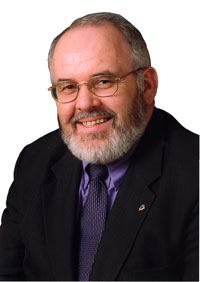8 March 2007 Edition
Interview : Francie Molloy, Sinn Féin National Commemorations Committee

Honouring those who gave their lives for the struggle
“My job is to co-ordinate activities around the main national commemorations. I’ll be liaising with the various commemoration committees and speakers in the different counties. I want to revamp the commemorations and work with the various individuals who have organised commemorations over the years, and to liaise with others involved in the same kind of activity.
“A key part of our role will be to promote the Easter commemorations and particularly the Easter Lily. The symbol is associated mainly with older republicans and although there’s great respect for the symbol, even amongst our political opponents, there isn’t that same awareness amongst younger people.”
Molloy sees the Lily as uniting people and feels that it should be promoted as a national symbol.
“We want to promote the Easter Lily and get more people to wear it, and to be comfortable with that and be proud of it.”
Molloy said that Easter is a major national commemoration and we need to be looking at bringing members of the Irish diaspora home for the event. We need to establish Easter as a major national occasion in the calendar as a commemoration of the 1916 Rising.
“Now is also the time to plan for 2016 – the centenary of 1916 – and to prepare for a national event in which everyone, not just those directly affiliated to republicanism, can play a part.
“In the immediate context, it’s important that with all the election work underway we don’t lose focus on the upcoming Easter commemorations and the distribution of Easter Lilies. I’m Assembly candidate for Mid Ulster and busy with that, but I see the vital importance of the commemorative work. We must always have a focus on the origins of Irish republicanism, the core principles involved and the people who gave their lives for the struggle.”
He is also seeking to promote a new focus on the annual Wolfe Tone Commemoration at Bodenstown, County Kildare.
“Although there was a major increase in the turnout for Bodenstown last year, we need to refocus on it because it’s an event that takes us back to our roots as republicans – back to Wolfe Tone – and it’s particularly important to bring people together at that one special event each year. But I also think it’s time to expand on the Bodenstown commemoration and perhaps to turn it into a national republican festival.
“We could turn the commemoration into a family event rather than just a parade. We need to make it more family-friendly, by organising activities in which children can be involved. We could put a different focus on bands so that their performance could be competitive as well as ceremonial.
“The Sallins area near Bodenstown is becoming increasingly populous, with more and more people moving there. We need to look at expanding and bringing new people in, people who aren’t necessarily connected with republicanism but want an event to attend. There’s an opening there. While we need to hold such commemorations with dignity, we also need to broaden our horizons. We need to involve more people. The committeer wants to develop the idea of entertainment around Bodenstown, a major concert or the like so that people can really enjoy the day.”
The Commemorations Committee is also looking towards the 50th anniversary of the Edentubber tragedy in County Louth where a number of republicans were killed during the IRA’s border campaign of the 1950s.
“We plan to work with the local committee there to revamp that commemoration. There’s a proposal to have the cottage where the Volunteers were killed in a premature explosion restored and to expand the commemorative garden in Edentubber looking over the Louth border.”
Another proposed project is the creation of a commemorative garden dedicated to women involved in the republican struggle.
“It’s going to be at the Roddy McCorley Centre in Belfast, on republican-owned land there. This would be a garden in natural woodland where people can go to relax. The whole idea is to remember all the women involved in our struggle – not just those killed on active service but also those who played a major role throughout the campaign over the years. There will be high costs involved and we in the National Commemorations Committee hope to play a role in helping the project along. Sinéad Walsh and Sue Ramsey are very much involved in this venture and are seeking to develop it as an all-Ireland project.”
Molloy makes the point that there’s quite a bit of work in store for the Commemorations Committee, especially at a time of hectic activity around elections and just after the 25th anniversary of the Hunger Strike, but stresses the importance of commemorating the republican dead.
“It’s important that we keep focused on the republicans who led this struggle and those who died, both in 1916 and since then, and also to remember the major role that women played in the struggle and to commemorate all those people.”
He readily invites ideas on how to expand and revamp the commemorative process.
“We can be contacted with any innovative ideas through Head Office at 44 Parnell Square or through the Arts Shop at 51-53 Falls Road, Belfast. Ideas people have in relation to expanding the commemorative events and bringing in a wider participation would be welcome.”


